Skulls Unlimited cleans over 50,000 skulls a year.
Learn More!

A real skeleton crew: Museum of Osteology opens in Moore
Oct 26, 2010
Brian Brus, The Journal Record
Even after Jay Villemarette fills his new 7,000-square-foot museum with exhibits, he'll still be left with a lot of empty space.
That's the nature of skeletons, after all: nothing but bones without skin or muscle to fill the gaps.
Consider the 40-foot humpback whale skeleton, for example, hanging from the rafters in the middle of the Museum of Osteology so that visitors on the second floor can look down and see other people through the bones.
"That is, by far, our prize piece," Villemarette said. "We get asked a lot, what is your 'holy grail?' But honestly I have to say we have a lot of holy grails. We've been very fortunate to have a lot of special specimens in our museum, a lot of pieces that other larger museums in the country don't even have.
"And we're not even halfway done yet," he said. "There's a lot more to come."
When Villemarette started construction on the 12,000-square-foot building in Moore in mid-2004, he intended to use less than half of it for Skulls Unlimited's corporate offices. The remaining space would be developed later to fulfill Villemarette's dream of a public museum so he could share his passion for osteology with others. That potential has finally been realized: October began with the museum's grand opening and will end with candy and prizes to celebrate Halloween on Saturday.
Skeletons are anything but spooky to Villemarette. He found his first skull in the woods when he was 7 years old; his father encouraged him to bring the dog specimen home and clean it up. He later did the same with a cat skull and was intrigued by the comparison.
Years later, he was still cleaning bones - even on his kitchen stove, much to the consternation of his wife - when he realized money could be made from the hobby. In 1986, Skulls Unlimited was born.
Now people routinely ship the company animal remains for cleaning and preparation. The company processes about 30,000 skull specimens per year and offers about 100 types of animal skulls for sale by catalog. It's the largest osteological supplies company in the country, if not the world, he said.
Many of the bones he receives are donations, found animals or untimely deaths at zoos, game farms and ranches. Villemarette said he accepts only legally and ethically obtained specimens. No animals are destroyed for the company.
His skeleton crew carves away as much tissue as possible by hand before turning over specimens to smaller workers: tanks of dermestid beetles, which eat all remaining tissue and leave nothing but bones.
Human specimens are a little trickier, because the bugs don't like our species as much, he said - people are unnaturally greasy because of our diets.
But none of the dirty work is obvious next door. The adjoining museum, which is a separate entity with 501(c) nonprofit status, already has 300 skeletons on display, less than half of what Villemarette plans. The exhibits range from a tiny shrew to the centerpiece whale.
Some of the rarer pieces include a Javan rhinoceros, a bonobo and Komodo dragon. Skulls Unlimited has specimens of 46 species of whales and dolphins; there are less than 80 species worldwide.
"It's anything other than a roadside museum," he said. "We've gone above and beyond to present this as attractively as possible. And everyone coming through has commented on how nice it is. They seem to be thanking us for being in Oklahoma."
The museum, which is at 10301 S. Sunnylane Rd., is open 9 a.m.-5 p.m. Monday through Friday and 11 a.m.-4 p.m. on Saturday. Entry costs $5 per person and is free to children 3 years old and younger.

Leave a comment